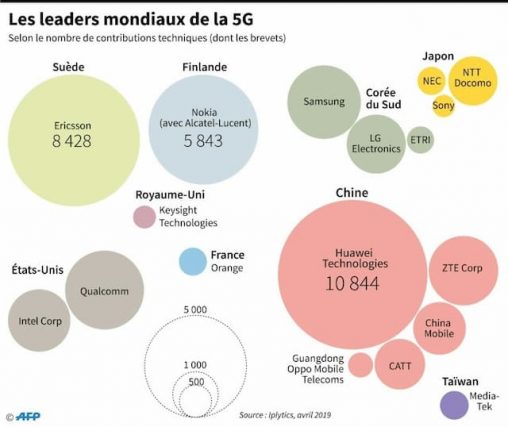5G will Arrive in France: Parliament Gives Green Light

The Senate voted definitively Wednesday 24th July 2019 a text to secure the deployment of 5G, which will, therefore, be able to land in France.
France will be able to move to 5G, expected as a real revolution in mobile telephony: Parliament gave Wednesday, July 24, 2019, by a final vote of the Senate, its final green light to a text to legally secure its deployment, facing the risks of espionage or sabotage.
Enabling the transmission of very large amounts of data much more quickly than today’s mobile telephony, it promises the development of futuristic technologies, autonomous car, remote surgery, automated factory and connected objects. But, the flip side, the 5G also exposes, by its power, to a new vulnerability, in particular in terms of national security.
A “protective” legal framework
The proposed law LREM, which was the subject of an agreement between deputies and senators in mixed joint commission, establishes a new authorization regime prior to the operation of 5G equipment, in order to reinforce the security of these future networks.
It was voted by a show of hands in the Senate, with the support of all groups.
“Substantially enriched by the Senate”, this text “is the subject of a political consensus and its provisions must enter into force quickly,” said rapporteur LR Catherine Procaccia.
It “allows to establish a stable legal framework, simple, protective, without delaying the deployment of the 5G,” said Secretary of State for the Economy Agnès Pannier-Runacher, stating that the government is finalizing the application texts.
Le travail avec l’Assemblée nationale et le Sénat a permis d’aboutir à un texte équilibré. La France dispose désormais d’une législation avancée pour assurer la sécurité de ses équipements connectés sans retarder le déploiement de la #5G. cc @Economie_Gouv @ebothorel @CProcaccia https://t.co/UM3udPBwfx
— Agnès Pannier-Runacher (@AgnesRunacher) 24 July 2019
Already available in San Marino and Monaco
The procedure for assigning 5G frequencies to telecom operators was officially launched on July 15th. France is hoping for a first commercial roll-out in a few major cities by the end of 2020 and coverage of two-thirds of the population by 2026.
“There will not be a 5G of cities and a 5G fields,” insisted Agnès Pannier-Runacher in front of the Chamber of Territories: “12 000 sites per operator will be equipped with 5G in 2025, a quarter in areas rural areas.
In Europe, 5G is available to users in Monaco and San Marino and is starting to be available in Switzerland, Finland, Estonia and the United Kingdom. Worldwide, it has already been launched in the United States and Asia.

Washington has banned Chinese equipment maker Huawei from deploying on US soil, accusing it of being a Trojan horse in Beijing, and asked its main allies, especially European, to dispense with Chinese equipment in their future networks. 5G.
However, the proposed law adopted by the French Parliament does not target a particular equipment manufacturer, assured the government.
Prior to any exploitation activity of certain electrical equipment which, by their functions, presents a risk for the security of the networks, the operators will have to send a request for authorization to the Prime Minister, who will make a decision within two months.
He may refuse the authorization “if he considers that there is a serious risk of prejudice to the interests of defence and national security”.
“Adequate response”
The challenge is also in terms of the maintenance of this equipment, says Agnès Pannier-Runacher. “The goal is to ensure that there is no vulnerability, either in maintenance or in upgrading interventions, with subcontractors that might not be reliable, for example.”
It is specified in the text, at the initiative of senators, that this new prior authorization regime does not apply to fourth-generation networks or previous generations.
The proposed law “is an adequate response” to issues of sovereignty and national security, said Jean-François Longeot (centrist), while promising to remain “attentive” to the issue of European harmonization and coverage of rural territories.
In the National Assembly, the agreement reached between deputies and senators had been approved last week by all groups, with the exception of Communists who abstained, regretting a “lack of ambition in matters of security. “.
Enjoyed this? Get the week’s top France stories
One email every Sunday. Unsubscribe anytime.


